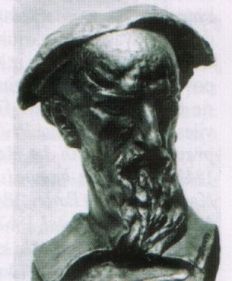Marko Marulic
|
|
Marko Marulić (Split, August 18, 1450 - Split, January 5, 1524), Croatian poet, apologist and Christian humanist is generally considered the father of vernacular Croatian literature.
Croatian writer, poet of Croatian and Latin verses also humanist and moralist, comes from the distinguished aristocratic family Pečenić. He used to sign books as Marko Marulić Splićanin ("from Split"), Marko Pečenić, Marcus Marulus Spalatensis, or Dalmata. He finished humanist school in Split (Dalmatia) and graduated law at Padua university. In Split, Marulić practiced law serving as a judge. The central figure of Split humanist circle, Marulić was inspired by the Bible, Antique writers and Christian hagiographies, and produced vast opus in Latin and Croatian languages.
Latin
His European fame rested mainly on his works written in Latin which had been published and re-published during 16th and 17th centuries and translated into many languages. De institutione bene vivendi per exempla sanctorum (1498) is a moralist tractate of Biblical inspiration. Evanglistarium (1500) a systematic discourse on ethical principles, and Davidias from 1504 a religious epic which fused Biblical motifs and Antique, Virgilian poetics. However, Marulić's Latin works of devotional and religious provenance, once adored and envied across Europe, shared the destiny that befell the genre in past two centuries: they vanished into oblivion.
Croatian
In the works written in Croatian language Marulić achieved permanent stature and position that remained uncontested. His central Croatian oeuvre, epic poem Judita (1521), is based on the Biblical tale from a Deuterocanonical Book of Judith, written in Croatian language (more specifically, Chakavian dialect). His other works in Croatian are:
- Suzana (Susan)
- Poklad i korizma (Carnival and Lent)
- Spovid koludric od sedam smrtnih grihov (Nun's confession of seven deadly sins)
- Anka satir (Anka the satire),
- Tuženje grada Hjerosolima (Jerusalem's Lament),
- Molitva suprotiva Turkom (Prayers asking to be saved from the Turks).
In his works he is neither aesthetically nor stylistically superior to the works of his Dubrovnik predecessors. Three puzzling facts tend to raise questions:
- Marulić's Croatian work is aesthetically plainly inferior to the lyric poetry of Hanibal Lucić and dramatic vitality of Marin Držić.
- His dialectal idiom was a rather archaic and did not play important role in the process of standardization of Croatian language — unlike the poetic and prose expression of writers from Dubrovnik, Korčula and Hvar like Hanibal Lucić and Petar Hektorović.
- Even chronology-wise, Džore Držić and Šiško Menčetić wrote in essentially modern Croatian Shtokavian dialect some 3 decades before him.
Marulić's national eminence is due to happy confluence of some other facts: no one of his contemporaries or predecessors had achieved fame during his lifetime. Also, his deeply patriotic and Catholic verses had assimilated frequently superficial and imitative poetry of his southern compatriots and transformed it into an epitome of Croatian national destiny. His Judith representing Croatian people fighting Ottoman Empire invasion – Marulić remained the ineradicable center of Renaissance Croatian patriotism – of Croathood itself. That is why his stature as the father of Croatian literature is secure and unshakeable.
The picture of Marko Marulić appears on the 500 kuna banknote.hr:Marko Marulić

